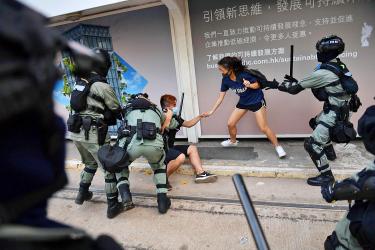All subway and train services were suspended, lines formed at the cash machines of shuttered banks and shops were closed as Hong Kong dusted itself off yesterday and then started marching again after another night of rampaging violence decried as “a very dark day” by Hong Kong Chief Executive Carrie Lam (林鄭月娥).
In a televised address broadcast as marchers in masks again took to the streets in defiance of her newly instituted ban on face coverings at rallies, a solemn Lam described Hong Kong as “semi-paralyzed” and in the grips of “unprecedented violence.”
The chief executive did not announce additional measures to quell increasing violence, beyond the ban criminalizing the wearing of masks at rallies that took effect at midnight.
She defended the legality of the measure denounced by government critics and demonstrators, and said that “to protect citizens’ daily lives and freedoms, I cannot allow the small minority of rioters to destroy that.”
“Everyone is worried and scared,” she said.
Many were fired up, too.
Shielded under umbrellas, many wearing masks, a cortege of hundreds of demonstrators clogged a thoroughfare in the central business district, carrying a yellow banner marked “Glory to Hong Kong” and shouting: “Hong Kong, resist!”
The closure of the entire MTR network that handles more than 4 million trips a day, including the express line to the Hong Kong international airport, caused major and quite exceptional disruption to the usually never-resting, but now edgy and restive, territory of 7.5 million people.
After widespread arson attacks, looting, fighting with police and beatings, the government appealed for a public shift in attitude against rioting.
By not condemning violence, people are stoking it, Hong Kong Secretary for Security John Lee (李家超) said.
“What is adding oil to violence is people’s support for these acts,” he said. “What is important is that everybody comes out to say, ‘No, society will not accept violence.’”
Yet even many peaceful protesters say violence has become a means to an end, the only way for young masked protesters to force the government to bend.
As a group of black-clad youths in protective gear rushed past him, many carrying bamboo sticks, a property industry worker who came out with his wife on Friday night to show his opposition to the mask ban expressed his admiration for those confronting police.
“I know they have done terrible things,” he said. “Can you believe how brave they are?”
First indications were that rather than soothe tensions, the ban had inflamed them.
Under the cover of darkness on Friday, masked protesters rampaged, setting fires, setting up makeshift road blocks that backed up traffic and vandalizing subway stations, China-linked businesses and other property.
An officer fired a single shot from his gun in self-defense after he was attacked by protesters in the northern Yuen Long district, Hong Kong Police Force Senior Superintendent Yolanda Yu (余鎧均) said.
She said a man was wounded, but police did not know exactly how he got shot.
A police official, who requested anonymity because he was not authorized to speak to the news media, said the victim is 14.
A Hospital Authority spokesman said the teen was in serious, but not critical condition.
Source: Taipei Times - 2019/10/06





















